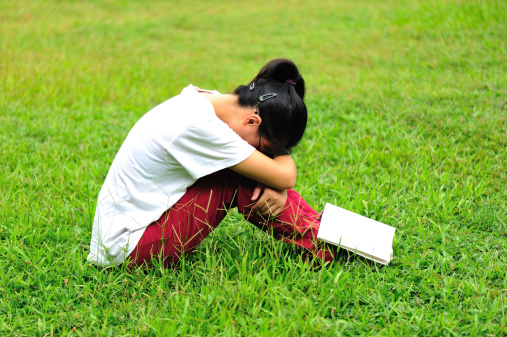 The mysteries associated with missing Malaysia Airlines flight 370 and with the recent sinking of a South Korean ferry serve as a reminder that uncertainty, especially when accompanied by tragedy, can itself be traumatic.
The mysteries associated with missing Malaysia Airlines flight 370 and with the recent sinking of a South Korean ferry serve as a reminder that uncertainty, especially when accompanied by tragedy, can itself be traumatic.
The reaction of family members to the disappearance of 239 passengers and crew members on board flight 370, and to the scores of bodies yet to be pulled from the South Korean ferry, which had carried more than 400, is not unexpected. The inevitable bereavement, acceptance and adjustment by victims’ families will follow, but not soon, and not completely for all those affected.
Managing the impact of uncertainty when tragedy threatens requires more than patience. It requires mindfulness and skill.
The aftermath of 9/11 offers examples of people coping with trauma-related uncertainty. Immediately following the terror attacks, part of New York City became paralyzed. Not only were friends and family members of the missing victims traumatized, but it seems that every New Yorker felt the psychological burden.
Residents became obsessed with watching images of planes crashing into the World Trade Center, or following the news for additional developments. The pace of work slowed not only because of the obstacles brought about by security arrangements but also because preoccupation with the attacks interfered with concentration.
People found they lacked initiative; they felt fatigued, and did not sleep so well as they had. They realized that under the circumstances they were not at their best. It became even more important to maintain a daily routine, to sustain the social rhythm of interaction and personal support. Contact with family, with classmates, with coworkers, with sources of spiritual sustenance, always important, became more so. The overwhelming majority of New Yorkers felt shock, but they adapted.
The gruff social façade that New Yorkers are famous for gave way to a more open, gentle accessibility, which pleasantly surprised people. Older adults, perhaps because of their life experience, were generally less distressed than younger persons were.
In my work with the elderly, I’ve been intrigued and heartened by their resiliency. I am a co-investigator on a National Institute of Mental Health grant examining personal and neighborhood characteristics that promote freedom from depression in old age. Also, for more than two decades I have been active in a program assisting Holocaust survivors, supported by the United Jewish Appeal and the Butler Foundation. I’d like to share the following anecdote from my sessions with a Holocaust survivor whom I’ll call Ruth.
Born in Czechoslovakia, separated in infancy from her mother, who had died of cancer, Ruth was raised by her grandparents until the Nazi regime sent them and her father to their deaths. She lied to the authorities about her age–telling them she was younger than her actual age to avoid being captured. That left her alive but alone. To this day she carries a piece of bread in her purse to remind her of those uncertain days when she didn’t know where to find her next meal or shelter from the elements.
She married, had children and worked outside the home but was repeatedly depressed, especially after the death of her husband. The terrible uncertainty of her adolescence and the aching void of a lost childhood left her resentful.
Her daughter, always caring and compassionate, found that whatever she did for her mother was never enough; Ruth remained attentive but reserved. Antidepressants and therapy eventually helped, but it was Ruth’s realization that her daughter could never fill the void for her that changed her perspective.
For Ruth, there was no forgetting what had happened, and the occasional nightmare kept the memories of those years of uncertainty vivid. Yet with the alteration in her outlook, her anger and longing became distant feelings rather than preoccupations. Even though she was living alone, she realized that she was somehow stronger and more resilient than she had thought; she was satisfied with the love of her grandchildren and developed a more stable relationship with her daughter. It had taken years, but Ruth was no longer defined by her losses. She was whole again–hurt, but whole.
Every traumatic situation carries with it different circumstances and degrees of uncertainty, and the impact varies greatly among people. But there are some underlying lessons that I’d like to offer—practices and frames of thinking that can help you better navigate uncertainty, especially when trauma strikes.
1. Recognize That Uncertainty Is Taxing
Uncertainty is stressful not only because it is defies control but also because it implies the threat of more trauma to come.
2. Focus on Active Coping
Passive acceptance is not the answer. Although you may not be able to control events, you can control yourself. Maintain your daily routine as closely as possible—including exercise. Reach out to people you trust, not only to talk but to engage in activities.
3. Limit Your Exposure to News
Thoughts of the event or uncertain outcome will inevitably intrude, so it is important to find distractions. Reduce the amount of news you read, watch and listen to.
4. Be Kind to Yourself and Others
You may be self-absorbed, or even short-tempered, so be ready to explain and to apologize if you inadvertently hurt someone’s feelings. You may not be at your best, so take time before making big decisions. Ask yourself: Do I have to decide now?
5. Reflect on Similar Experiences
Ask yourself: How did I manage? To whom did I turn? Remember that you’ve weathered uncertainty—either brief or prolonged–before, and you managed to get on with your life.
Recovery from trauma-related uncertainty can take time. Things will be missed; opportunities will be lost. Do not waste the opportunity to reach out to those you care about. The memory of a kind word or a caring gesture will endure long after the uncertainty has passed.

